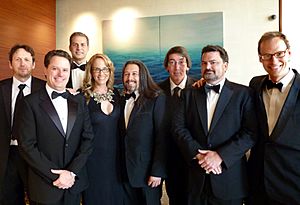Will Wright (game designer) facts for kids
Quick facts for kids
Will Wright
|
|
|---|---|

Wright speaking at the 2010 Game Developers Conference
|
|
| Born |
William Ralph Wright
January 20, 1960 |
| Alma mater | |
| Occupation | Game designer |
| Known for | |
| Spouse(s) |
Joell Jones
(m. 1984, divorced)
|
| Children | 1 |
William Ralph Wright (born January 20, 1960) is an American video game designer. He is famous for creating popular video games like SimCity, The Sims, and Spore. He also helped start a company called Maxis, which later joined Electronic Arts.
Will Wright's first computer game was Raid on Bungeling Bay in 1984. But it was SimCity that made him well-known. This game let players build and manage their own cities. He kept making games that focused on simulating real-world things, like SimEarth and SimAnt.
He is most famous for creating The Sims series. The first Sims game came out in 2000. It became a huge hit and led to many sequels like The Sims 2, The Sims 3, and The Sims 4. His game Spore, released in 2008, lets players guide creatures through evolution.
In 2007, Will Wright received the BAFTA Fellowship. This award is usually given to people in film and TV, making him the first game designer to get it.
Contents
Early Life and Education
Will Wright was born in Atlanta, Georgia, on January 20, 1960. His father was an engineer and his mother was an actress. He went to a special Montessori school until he was nine. When his father passed away, he moved to Louisiana with his mother and sister. He finished high school when he was 16.
Will became interested in game design when he was a child. He loved the Chinese strategy board game Go. He said it had "simple rules" but "complex strategies." He was amazed that something so simple could lead to such complex play. As a teenager, he also enjoyed playing board wargames.
After high school, Wright studied architecture at Louisiana State University. He then switched to mechanical engineering at Louisiana Tech. He was very interested in robotics, space, and military history. He later moved to New York City and taught himself computer programming. He spent five years in college but did not get a degree.
Career in Game Design
Will Wright started designing games for the Commodore 64 computer. His first game was Raid on Bungeling Bay in 1984. It was an action game where players flew a helicopter and dropped bombs.
Wright found that he enjoyed creating the islands for Raid on Bungeling Bay more than playing the game itself. This gave him the idea for a new game that became SimCity. He had trouble finding a company to publish it at first. The game's ideas were partly inspired by thinkers who studied cities and systems.
Creating Maxis and SimCity

In 1986, Wright met Jeff Braun, who was interested in computer games. They started their company, Maxis, in 1987. SimCity (1989) became a huge success. Many people consider it one of the most important computer games ever made.
After SimCity became popular, Wright designed SimEarth (1990) and SimAnt (1991). He also helped design SimCity 2000 (1993). Maxis made other "Sim" games too. Wright's next game was SimCopter (1996). These games helped build his reputation for creating "software toys." These are games that don't have a winning or losing goal, but can be played forever.
Wright is known for his interest in how complex systems work. Many of his games are based on these ideas or books about them. For example, SimAnt was inspired by a book about ants. He likes to create "possibility spaces" in his games. These are simple rules that combine to form complex and interesting designs.
Maxis became a public company in 1995. Later, Electronic Arts (EA) bought Maxis in June 1997.
The Sims and Spore
After losing his home in a fire in 1991, Wright was inspired to create a game about rebuilding life. He started working on an idea for a virtual doll house. This idea grew into The Sims. The game was originally about designing homes, but it changed when someone suggested that virtual homeowners should rate the houses.
The leaders at Maxis were not very interested in The Sims at first. But Electronic Arts saw its potential. EA published The Sims in February 2000. It became Wright's biggest success. It even became the best-selling computer game of all time. Many expansion packs and spin-off games followed. By 2006, The Sims games had earned EA over a billion dollars.
In 2005, Wright announced his next big game, Spore. This game lets players guide a creature from a tiny cell to a space-faring civilization. Wright hoped Spore would encourage other game creators to take risks.
Wright believes that games and simulations can help improve education. He thinks they can teach children how to learn by exploring and experimenting.
After Maxis
Will Wright left Maxis in 2009. He started a new company called Stupid Fun Club. This company focused on creating new kinds of entertainment, including video games and online experiences.
In 2010, Stupid Fun Club produced a TV show called Bar Karma. This show used ideas and twists suggested by an online community. Stupid Fun Club operated for four years. After it closed, many of the team members joined Wright to create a social media app called Thred.
In 2011, Will Wright joined the board of directors for Linden Lab, the company that created Second Life.
In 2018, Will Wright announced a new mobile game called Proxi. In 2021, he announced another project called VoxVerse with Gala Games. VoxVerse is a blockchain game where players can create and share areas. Wright believes that blockchain technology helps support his vision for player creativity. This game is being developed by Gallium Games, a studio he co-founded.
Awards and Recognition
Will Wright has received many awards for his work. In 2001, he got a "Lifetime Achievement Award" at the Game Developers Choice Awards. In 2002, he was added to the Academy of Interactive Arts and Sciences' Hall of Fame. In 2007, he received the British Academy of Film and Television Arts fellowship, a first for a game designer.
He has been called one of the most important people in gaming and technology by many magazines. He also received the PC Magazine Lifetime Achievement Award in 2005.
Personal Life
Will Wright lives in Oakland, California. He has a daughter named Cassidy, born in 1986. In 1991, his family lost their home in a large fire. This experience later inspired The Sims. He is now married to Anya Zavarzina.
Wright is on the board of trustees for the X Prize Foundation. This group creates competitions to encourage new technology that helps humanity.
Hobbies and Interests
Will Wright has many interesting hobbies. In 1980, he took part in an illegal cross-country car race called the U.S. Express. He and his co-driver won the race, driving from New York to California in just over 33 hours.
Since 2003, Wright has collected items from the Soviet space program. His collection includes parts from a space shuttle and a Soyuz capsule. He also collects dolls, dice, and fossils.
Wright used to build competitive robots for BattleBots with his daughter. One of his robots, "Kitty Puff Puff," would wrap opponents in tape to stop them from moving. This technique was later banned.
Games Created by Will Wright
| Year | Title | Developer |
|---|---|---|
| 1984 | Raid on Bungeling Bay | Will Wright |
| 1989 | SimCity | Maxis |
| 1990 | SimEarth | |
| 1991 | SimAnt | |
| 1992 | SimLife | |
| 1993 | SimCity 2000 | |
| 1996 | SimCopter | |
| 2000 | The Sims | |
| 2002 | The Sims Online | |
| 2008 | Spore | |
| 2008 | Spore Creature Creator | |
| TBA | Proxi | Gallium Studios |
See also
 In Spanish: Will Wright para niños
In Spanish: Will Wright para niños
 | Isaac Myers |
 | D. Hamilton Jackson |
 | A. Philip Randolph |

